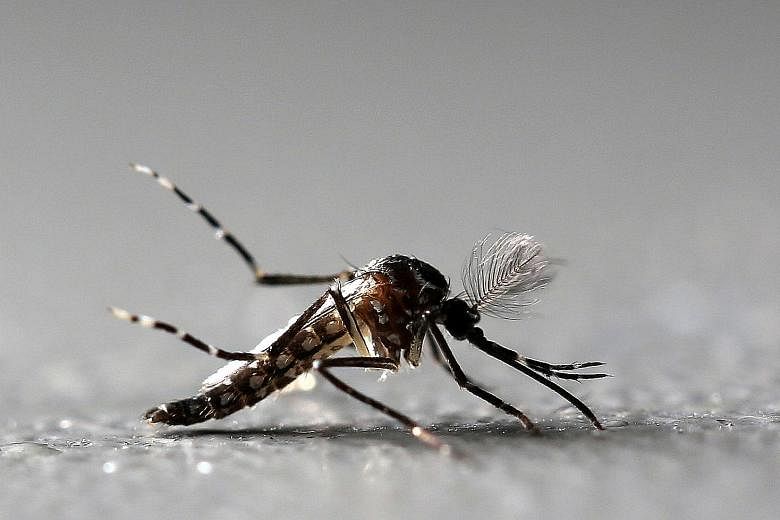PIRACICABA (Brazil) • Scientists in Brazil are preparing to release millions of factory-bred mosquitoes in an attempt to wipe out their distant cousins that carry tropical diseases.
The insects' method: have sex and then die.
British firm Oxitec says its genetically modified mosquitoes will swarm in among ordinary species like the Aedes aegypti, the insect that carries feared diseases such as Zika, dengue, yellow fever and chikungunya.
They will mate with the females of the ordinary mosquitoes, spawning babies with a genetically in-built flaw that causes them to die quickly. With their work done, the modified father mosquitoes will then give up their ghost themselves - as they are genetically programmed to do.
Oxitec says its factory in the town of Piracicaba, north-west of Sao Paulo, can produce 60 million mutant mosquitoes a week.
Piracicaba is the world's "first and biggest factory" of genetically modified mosquitoes, said Oxitec president Hadyn Parry. "This is the only place where we have a factory like this. We can use this as a hub for Brazil," said Mr Parry, who travelled to Piracicaba for the plant's opening.
Currently, its only Brazilian customer is the city of Piracicaba, "but we are having conversations with several municipalities and states", Mr Parry said.
According to the firm, five field tests that it conducted between 2011 and 2014 - in Panama and the Cayman Islands, as well as the north-eastern Brazilian state of Bahia - showed the population of wild Aedes aegypti insects dropped by 90 per cent after the mutant mosquitoes were released.
Oxitec does not yet have a sales permit from Brazil's Anvisa health authorities, and there are no epidemiological studies showing whether mosquito-carried diseases dropped after the factory-bred insects were released.
Mr Parry is not concerned. "We are still waiting for the Anvisa approval - we have no date for it, but we expect it for 2017," he said.
And none of this has stopped the mayor of Piracicaba from signing a four-year, US$1.1 million (S$1.5 million) deal with Oxitec. In its first wave, the company will release 10 million factory-bred mosquitoes each week into this city of 360,000 people.
The need for insect control is pressing, as the summer in the Southern Hemisphere approaches and the mosquito population - and cases of the diseases that they carry - is likely to boom. As of July, nearly 1.4 million cases of dengue were recorded in Brazil, following the record 1.6 million cases last year, according to Health Ministry figures. In the same period, 174,000 cases of Zika were reported.
The Zika virus outbreak began late last year in Brazil and has since spread across the Americas. Zika is particularly dangerous to pregnant women because it can cause birth defects such as microcephaly, in which babies are born with unusually small heads and brain deformities. Zika infection has also been linked to a nerve and immune disorder called Guillain-Barre syndrome.
Scientists keep the spacious rooms at the Piracicaba factory at temperature and humidity levels ideal for mosquito breeding. While female mosquitoes are kept for breeding, male mosquitoes of the OX513A breed - specially developed by Oxitec in 2002 - are released to mate with females in the wild, produce short-lived offspring, then die.
Oxitec biologist Karla Tepedino dismisses environmentalists' concerns about the lack of long-term impact studies. "There are three essential factors for the transmission of these diseases: the mosquitoes, the virus and humans. What we do here is eliminate the mosquitoes which transmit the virus," Ms Tepedino told AFP.
"Eliminating the vector, we eliminate the disease," she said.
The Aedes aegypti mosquito is well adapted to city life as it can breed in even tiny amounts of water, such as a puddle of rainwater or water pooled in flower pots.
Experts have pointed to poor sanitation and the practice of storing open water containers in poor neighbourhoods as contributing factors in the explosive growth of the mosquito population.
Separately, Rio de Janeiro authorities are attempting to control their mosquito population by releasing insects inoculated with Wolbachia bacteria, which makes them resistant to Zika, dengue and other viruses.
AGENCE FRANCE-PRESSE

